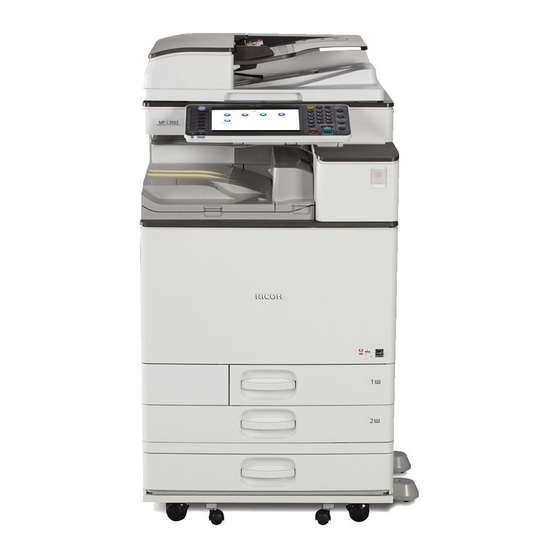Ricoh MP C6003 Manual - Page 30
Browse online or download pdf Manual for Copier Ricoh MP C6003. Ricoh MP C6003 44 pages. Envelope printing, setup & printing
Also for Ricoh MP C6003: Brochure & Specs (12 pages), User Manual (36 pages), Function Setup Manual (5 pages), Administrator's Manual (48 pages), Training Exercise (4 pages)

3. Other Information for This Machine
nanometer wavelength for each emitter. The beam divergence angle is 16 degrees (minimum) and 23
degrees (maximum) in the vertical direction, and 7 degrees (minimum) and 12 degrees (maximum) in
the horizontal direction, and laser beams are generated in Continuous Wave (CW) mode. Each 4ch-
LDA has four light sources and the maximum output power of the light source is 17 milliwatt.
Caution:
Use of controls or adjustments or performance of procedures other than those specified in the manuals
might result in hazardous radiation exposure.
Notes to USA Users of FCC Requirements
Part 15 of the FCC Rules
Declaration of Conformity
This device complies with Part 15 of the FCC Rules.
Operation is subject to the following two conditions:
(1) This device may not cause harmful interference, and
(2) this device must accept any interference received, including interference that may cause
undesired operation.
Responsible party: Ricoh Americas Corporation
Address: 5 Dedrick Place, West Caldwell, NJ 07006
Telephone number: 973-882-2000
Product Name: Multi Function Peripheral
Model Number:
• Type 1: MP C3003SP/MP C3003SPG
• Type 2: MP C3503SP/MP C3503SPG
• Type 3: MP C4503SP/MP C4503SPG
• Type 4: MP C5503SP/MP C5503SPG
• Type 5: MP C6003SP/MP C6003SPG
Note:
This equipment has been tested and found to comply with the limits for a Class B digital device,
pursuant to Part 15 of the FCC Rules. These limits are designed to provide reasonable protection
against harmful interference in a residential installation. This equipment generates, uses and can
radiate radio frequency energy and, if not installed and used in accordance with the instructions,
may cause harmful interference to radio communications. However, there is no guarantee that
interference will not occur in a particular installation. If this equipment does cause harmful
interference to radio or television reception, which can be determined by turning the equipment off
28
